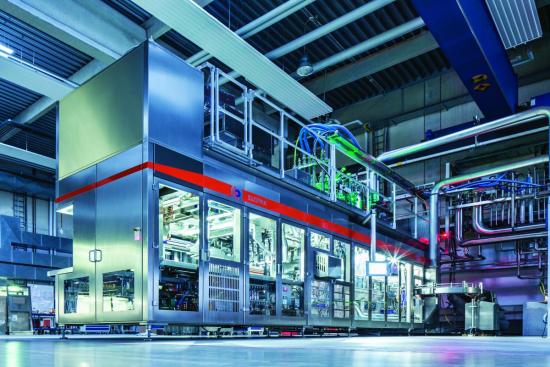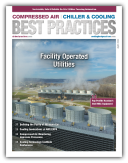The AS Series Maintenance unit ensures high compressed air quality.
Machines for filling milk or juice must often work around the clock. Given the critical importance of uptime, Elopak opted for Aventics food-compliant pneumatics when developing its E-PS120A - the first fully aseptic filling machine for gable top packaging.
With an output of up to 12,000 cartons per hour, disruptions and downtime are not welcome with the aseptic filling machine said Wolfgang Buchkremer, Senior Manager Research & Engineering at Elopak EQS GmbH in Mönchengladbach, Rather, high reliability is of the upmost importance, he adds.
“The latest technical features are not our main concern when selecting components,” Buchkremer, said. “We need components that play their part without standing out - we want to be able to install and then forget them. And that isn’t possible with just any component.”

The Elopak E-PS120A fully aseptic filling machine.
The Goal: Meet Customer Expectations, Industry Requirements
In developing its E-PS120A machine, Elopak leveraged its Pure-Pak® Advanced filling concept. It meets both increasing expectations of consumers regarding product design, functionality and quality, and industry requirements regarding maximum efficiency and machine availability.
The E-PS120A machine offers advanced automation technology and is divided into six modules. The inserted packaging material is recorded, set upright, and pre-folded. The sealing cap is then applied via ultrasound welding and the bottom is heated and pressed to seal the carton. In a separate chamber, the packaging is sterilized with hydrogen peroxide, and the product is then filled with a single shot. Finally, the packaging is induction-welded and transported out of the machine.
With this system, users can choose from three packaging sizes of 500 ml, 750 ml, and 1 L. Since all machine processes are geared to the packaging height, the only adjustment required to switch between them is the height of the bottom of the carton. Performed by a cylinder, this movement takes just a few minutes and provides a major advantage.
Aventics’ CCI compact cylinder facilitates adjustments for packaging heights.
Machine Addresses Complex Tasks
The design and construction of the filling machine involves the need for the unit to address complex tasks. A sterile environment and aseptic packaging are vital to maintain product quality for the long term at room temperature without cooling the products, or using other methods. This means the ultra-sensitive drinks, dairy products, and liquid foods have to be filled hygienically and securely while the machine components are subjected to extreme environmental conditions such as cold, humidity and splashes.
“Frequently, permanent reliability comes down to the details,” said Buchkremer. Referring to the close collaboration with Aventics, he said: “Even though the pneumatic components installed at first appear insignificant, they are crucial to machine availability and aseptics. In addition to reliable components, we also need close contact and collaboration with suppliers based on partnership to detect optimization potentials in good time and drive improvements forward together.”
Cylinder Operation Based on Precision
On the E-PS120A machine, an Aventics SSI series compact cylinder isolates sealing caps by moving them from one side to another. It sounds like a simple task, but it has to function precisely, around one million times a week in day-to-day operations.
Using concrete application data supplied by Elopak, Aventics reinforced the piston package, extending the cylinder’s service life, which in turn has a positive effect on machine availability. Other cylinders move packaging forward up to the next processing step. Pressure varies depending on the position and amount of packaging on a rail. Here, the Aventics ED02 electropneumatic pressure regulator ensures precise, dynamically controlled pressure, enabling an optimized, energy-efficient process.
Safety and Quality in Compressed Air: Why You Should Care - Webinar RecordingDownload the slides and watch the recording of the FREE webcast to learn:
|
Throttles Key to Sterilization Process
Hydrogen peroxide (H2O2) is used to sterilize the packaging, but has an effect on all reactive components, including sealing materials and grease, which are standard for throttles. Here, choosing the wrong material poses a risk to the entire sterilization process in the long run.
“We worked with Aventics to find a suitable solution, and now use a throttle that has been cleaned on the inside, with a special sealing ring on the sterilization system’s vaporizer. These design details allow us to achieve higher stability,” said Johannes Platen, responsible for Engineering and Mechanical Design at Elopak EQS.
A corner strip with an all-round seal prevents the valves from coming into direct contact with H2O2-impregnated air in a standard valve system.
Valves Optimized for Reliability and Safety
The use of HO-impregnated air also resulted in an application-specific development. To extend the valves’ service life, Aventics combined a standard valve system with an aluminum corner strip including an all-round seal. Now, the valve pilots engage directly in the closed cable conduit within the machine, while the outlets exit the machine. This effectively prevents problematic contact between valves and hydrogen peroxide, contributing to optimized reliability.
Aventics’ quick exhaust and soft start valves are a special unit consisting of three Aventics components, mainly for machine safety to meet the required performance level. Combined with a soft-start and a blocking valve, an AS series maintenance unit offers an array of functions. After a safety cut-out and when the system is depressurized, for example by opening the doors, the valve systems should not be subjected to the full 6 bars of pressure immediately upon restart. The application-specific design now ensures the valve systems are slowly filled with compressed air.
Hygienic Safety a Top Priority
Aventics leveraged its experience in designing hygienic components for the machine. This is reflected in numerous properties of components customized specifically for utmost food safety. This means no recesses or sharp edges, easy cleaning and disinfection, as well as the use of food-compliant materials and lubricants, and resistance to chemicals.
“Aventics provided Elopak EQS with support right from the start and knows what it means to monitor a near-series machine in development. The pneumatic components made a major contribution in the reliability and low-maintenance requirements of our innovative aseptic filling machine, not least for these reasons. This all boosts machine availability,” said Buchkremer. “Furthermore, Aventics and Elopak support the VDMA initiative to standardize consumption measurement so we are on the same level when it comes to determining energy efficiency, able to implement this together to the user’s advantage.”
Elopak will also use the Aventics Advanced Valve series, which is optimized for future requirements for continuous data exchange from the control to the lowest field level. “This meets our desire to continue driving fieldbus technology forward, also in pneumatics,” said Platen, adding: “This development, too, will be realized in close collaboration with Aventics.”
About Elopak
If your milk carton doesn’t spill or make a mess when you open it, the packaging is very likely from the Elopak Pure-Pak series. The leading global supplier of paper-based packaging solutions for liquid food products is headquartered in Norway and belongs to the Ferd Group. Elopak develops, produces, sells, and maintains complete systems for packaging non- carbonated liquid products, such as milk and dairies, juices, wine, water, and soups. Elopak is the best-known supplier of gable top cartons with its Pure- Pak® brand.
Since 2011, Elopak EQS GmbH has been headquartered in Mönchengladbach, now employing around 130 staff. EQS stands for equipment supply and includes everything from machine construction to the development and production of pourer sealing systems.
About Aventics
Aventics is one of the world’s leading manufacturers of pneumatic components, systems, and customer-specific applications. The pneumatic engineering company provides products and services for industrial automation, additionally focusing on the sectors of commercial vehicles, food and beverage, railway technology, life sciences, energy, and marine technology. By integrating electronics, the use of innovative materials and prioritizing trends such as machine safety and the Internet of Things, Aventics is a pioneer in intelligent and easy-to-use solutions.
With over 150 years of expertise in pneumatics, Aventics employs around 2,000 associates worldwide. In addition to production sites in Germany (Laatzen), France (Bonneville), Hungary (Eger), USA (Lexington), and China (Changzhou), Aventics is represented in more than 90 countries through direct sales and dealers. The Aventics Group has received multiple certifications, including ISO 9001 and ISO/TS 16949 for quality, ISO 50001 for energy management, and ISO 14001 for environmental management. Further information is available at www.aventics.com/us.
All photos courtesy of Aventics.
To read similar Food Industry articles, please visit www.airbestpractices.com/industries/food.




